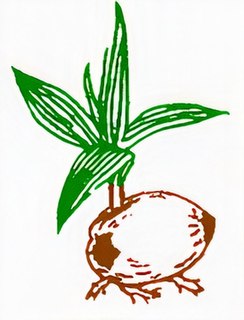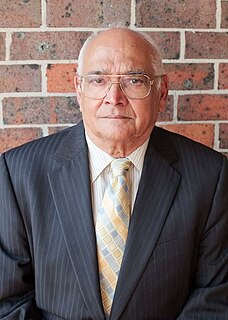Related Research Articles

The Fiji Labour Party (FLP),also known as Fiji Labour,is a political party in Fiji. Most of its support is from the Indo-Fijian community,although it is officially multiracial and its first leader was an indigenous Fijian,Dr. Timoci Bavadra. The party has been elected to power twice,with Timoci Bavadra and Mahendra Chaudhry becoming prime minister in 1987 and 1999 respectively. On both occasions,the resulting government was rapidly overthrown by a coup.
Irene Jai Narayan, was an Indian born teacher and politician,who had a significant influence on politics in Fiji. She came to Fiji in 1959 after marrying Jai Narayan,a well known school Principal in Suva,and began her career as a teacher. She taught in DAV Girls School and MGM High School in Suva before entering politics.
Siddiq Moidin Koya (1924–1993) was a Fijian Indian politician,Statesman and Opposition leader. He succeeded to the leadership of the mostly Indo-Fijian National Federation Party (NFP) on the death of the party's founder,A. D. Patel,in October 1969,remaining in this post until 1977. He later served a second term as leader of the NFP,from 1984 to 1987.

The National Federation Party is a Fijian political party founded by A.D. Patel in November 1968,as a merger of the Federation Party and the National Democratic Party. Though it claimed to represent all Fiji Islanders,it was supported,in practice,almost exclusively by Indo-Fijians whose ancestors had come to Fiji,mostly as indentured labourers,between 1879 and 1916. However,in the 2018 General elections the party recorded a considerable change in its support base as a consequent of the inclusion of more indigenous Fijian candidates.
Sir Vijay Raghubar Singh,KBE was an Indo-Fijian lawyer and politician who held Cabinet office in the 1960s and 1970s. Vijay Singh served in Prime Minister Ratu Sir Kamisese Mara's government in a variety of positions,including Attorney-General,and was president of the Indian Alliance,a division of the ruling Alliance Party. He quit the party in 1979 following disagreement with Alliance leadership and later joined the opposition National Federation Party. Vijay Singh was involved in the restructure of the Fiji sugar industry and was a leading member of the Jaycees movement in Fiji.

Communal constituencies were the most durable feature of the Fijian electoral system. In communal constituencies,electors enrolled as ethnic Fijians,Indo-Fijians,Rotuman Islanders,or General electors vote for a candidate of their own respective ethnic groups,in constituencies that have been reserved by ethnicity. Other methods of choosing parliamentarians came and went,but this feature was a constant until their final abolition in the 2013 Constitution.

National constituencies were a former feature of the Fijian electoral system. They were created as a compromise between demands for universal suffrage on a common voters' roll,and for a strictly communal franchise,with Parliamentary constituencies allocated on an ethnic basis and elected only by voters enrolled as members of specific ethnic groups.

Local elections were held in Fiji on 22 October 2005 to elect the councils of eleven municipalities. In Suva,the elections for the Suva City Council were postponed until 12 November due to the death of two candidates;the death of a candidate in Lautoka also resulted in the postponement of the poll in one of the four wards.

Western United Front (WUF) was an ethnically Fijian political party formed prior to the 1982 elections and contested the election in coalition with the National Federation Party.
Raojibhai Dahyabhai Patel was an Indo-Fijian lawyer and politician,who was better known as the younger brother of A. D. Patel. To distinguish between the two,he was generally referred to as R.D. A member of parliament from 1966 until 1976,he was Speaker of the House of Representatives between 1972 and 1976.
James Shankar Singh,MBE was a Fiji Indian farmer,businessman,social worker and politician who served as a Minister in the Alliance Government of Ratu Sir Kamisese Mara. Like many Fiji Indian politicians of the era,he joined the Alliance Party with a belief in mutiracialism,but was disappointed with the Alliance Party's appeal to Fijian nationalism after 1977 and left the Alliance to join the National Federation Party.
The Federation Party was Fiji's first formal political party. The Citizens Federation,which had won three of the four seats reserved for Indo-Fijians at the 1963 elections,decided to formalize its role as a political party,which was officially founded on 21 June 1964 with A. D. Patel as President and Sidiq Koya as Vice-President. The merger took place in time for the party to participate in the 1965 constitutional conference which was called to map out a path towards independence from the United Kingdom. In 1968,the Federation Party merged with the National Democratic Party to form the National Federation Party,which is now (2021) the oldest political party in Fiji still in existence.
Davendra Singh was a Fiji Indian small businessman and politician who came into prominence when he challenged and defeated the official National Federation Party (NFP) candidate in a by-election in March 1985.

Karam Chand Ramrakha was a former Fiji Indian lawyer,union leader and politician,who served in colonial Fiji's Legislative Council and independent Fiji's House of Representatives from 1966 to 1982.
The Flower Faction was one of the factions of the National Federation Party (NFP) to contest the September 1977 elections in Fiji.
Uday Singh Commissioner of Oaths,OBE,JP,was an Indo-Fijian landowner,social worker and politician. Hon. Mr Singh was a staunch supporter of former Prime Minister Ratu Mara and the former Alliance Party. The Singh family is the single largest private landowner in Fiji.
The number of Fiji Indians that could be elected to the Legislative Council was fixed over the years as follows:
Charan Jeath Singh is a Fiji Indian who has been involved in local Government and national politics in Fiji representing various political organisations.
Shiromaniam Madhavan,son of a founding member of the National Federation Party (NFP),was a Fiji Indian politician who served in the Labasa Town Council and the House of Representatives. He contested numerous elections for different political parties.
References
- ↑ Howard, Michael (1991). Fiji: Race and politics in an island state . Vancouver: UBC Press. pp. 383. ISBN 0-7748-0368-1.
- ↑ "Fiji Times '94 General Election Scoreboard". Fiji Times. 28 February 1994.